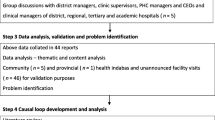Abstract
Open Dialogue is a model of mental health services that originated in Finland and has since, been taken up in trial teams worldwide. As this is a relatively unknown approach in the UK, it is important to tentatively explore perspectives of NHS staff and service-users. Sixty-one Open Dialogue conference attendees, both staff and service-users, were recruited for this study. A feedback questionnaire was administered to determine the extent to which they believed the key tenets of Open Dialogue were important to service user care, and the extent to which they existed within current NHS services. Analysis of data demonstrated a strong consensus on the importance of the key principles of Open Dialogue for mental health care and also moderate disagreement that these principles exist within current NHS service provision. The Open Dialogue principles may offer a useful framework in order to develop services in a clinically meaningful way.
Similar content being viewed by others
References
Allot, P., Loganathan, L., & Fulford, K. W. M. (2002). Discovering hope for recovery. Canadian Journal of Community Mental Health, 21(3), 1–22.
Anderson, H. (1990). Then and now: From knowing to not-knowing. Contemporary Family Therapy Journal, 12, 193–198.
Andreasen, R., Oades, L., & Caputi, P. (2003). The experience of recovery from schizophrenia: Towards an empirically validated stage model. Australian and New Zealand Journal of Psychiatry, 37, 584–594.
Borg, M., Karlsson, B., Tondora, J., & Davidson, L. (2009). Implementing person-centered care in psychiatric rehabilitation: What does this involve? Israel Journal of Psychiatry and Related Sciences, 46(2), 84–93.
Braun, V., & Clarke, V. (2006). Using thematic analysis in psychology. Qualitative Research in Psychology, 3(2), 77–101.
Campbell, P. (2005). From little acorns—The mental health service user movement is a sample chapter from beyond the water towers. London: The Sainsbury Centre for Mental Health.
Chadwick, P. (1997). Recovery from psychosis: Learning more from patients. Journal of Mental Health, 6(6), 577–588.
Holma, J., & Aaltonen, J. (1998). Narrative understanding in acute psychosis. Contempory Family Therapy, 20, 253–263.
Jackson, V. (2012). Developing Open Dialogue. from http://www.developingopendialogue.com/about.html.
Lloyd-Evans, B., Johnson, S., Slade, Mike, Barrett, B., Byford, S., Gilburt, H., & Thornicroft, G. (2010). In-patient alternatives to traditional mental health acute inpatient care. London: NIHR.
Morgan, S. (2000). Clinical risk management—A clinical tool and practitioner manual. London: The Sainsbury Centre for Mental Health.
NICE. (2014). Psychosis and schizophrenia in adults: Treatment and management. London: National Institute of Clinical Excellence.
Overall, J., & Gorham, D. (1962). The brief psychiatric rating scale (BPRS). Psychological Reports, 10, 799–812.
Pitt, L., Kilbride, M., Nothard, S., Welford, M., & Morrison, A. P. (2007). Researching recovery from psychosis: A user-led project. Psychiatry Bulletin, 31, 55–60.
Razzaque., (2014). Introduction to peer-supported open dialogue. London: North East London Foundation Trust.
Scandinavian Network (2011). www.scandinaviannetwork.com.
Seikkula, J. (2002). Open dialogues with good and poor outcomes for psychotic crises: Examples from families with violence. Journal of Marital and Family Therapy, 28(3), 263–274.
Seikkula, J., Aaltonen, J., Alakare, B., Haarakangas, K., Keranen, J., & Lehtinen, K. (2006). Five year experience of first episode nonaffective psychosis in open-dialogue approach: Treatment principles, follow-up outcomes, and two case studies. Psychotherapy Research, 16(02), 214–228.
Seikkula, J., Aaltonen, J., Rasinkangas, A., Alakare, B., Holma, J., & Lehtinen, K. (2003a). Open dialogue approach: Treatment principles and preliminary results of a Two-year follow-up on first episode schizophrenia. Ethical and Human Sciences and Services, 5, 163–182.
Seikkula, J., Alakare, B., & Aaltonen, J. (2001a). Open dialogue in psychosis I: An introduction and case illustration. Journal of Constructivisit Psychology, 14, 247–265.
Seikkula, J., Alakare, B., & Aaltonen, J. (2001b). Open dialogue in psychosis II: A comparison of good and poor outcome cases. Journal of Constructivisit Psychology, 14, 267–284.
Seikkula, J., Alakare, B., Aaltonen, J., Holma, J., Rasinkangas, A., & Lehtinen, V. (2003b). Open dialogue approach: Treatment priciples and preliminary results of a two-year follow-up on first episode psychosis. Ethical and Human Sciences and Services, 5(3), 163–182.
Seikkula, J., & Olsen, M. (2003). The open dialogue approach to acute psycholosis: Its poetics and micropolitics. Family Processes, 42(3), 403–418.
Silverstein, S. M., & Bellack, A. S. (2008). A scientific agenda for the concept of recovery as it applies to schizophrenia. Clinical Psychology Review, 28(7), 1108–1124.
Szasz, T. (2010). Psychiatry, anti-psychiatry, critical psychiatry: What do these terms mean? Philosophy, Psychiatry & Psychology, 17(3), 229–232.
Conflict of interest
None.
Author information
Authors and Affiliations
Corresponding author
Rights and permissions
About this article
Cite this article
Razzaque, R., Wood, L. Open Dialogue and its Relevance to the NHS: Opinions of NHS Staff and Service Users. Community Ment Health J 51, 931–938 (2015). https://doi.org/10.1007/s10597-015-9849-5
Received:
Accepted:
Published:
Issue Date:
DOI: https://doi.org/10.1007/s10597-015-9849-5




